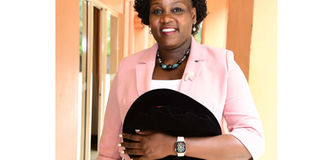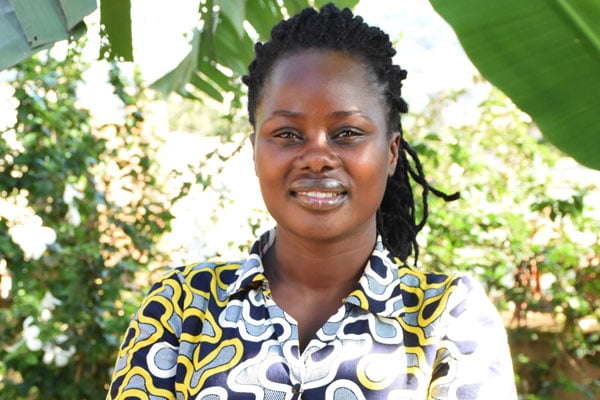Prime
Dr Epiu practices the gospel of safe anaesthesia

Dr Isabella Epiu
What you need to know:
- For more than a decade, Epiu has won awards and fellowships for strongly advocating for better maternal and neonatal health in Africa.
In the private wing of one public hospital, one mother chooses a Caesarian birth and wants to stay awake throughout the procedure. In the general wing, another mother, after hours of horrible pain, is sedated before a Caesarian, despite her chronic low-blood pressure.
Both mothers make it. But while the first one immediately bonded with her baby, the other was just lucky. Doctors struggled to recover her consciousness, and her baby was weakened by the sedatives.
Dr Isabella Epiu wishes all women had less painful labour, through regional anaesthesia— a type of pain management for surgery that numbs a large part of the body, like from the waist downwards. She is worried few can access it. Not only due to cost, but also the lack of know-how and equipment such as ultrasound scanners, special drugs, catheters, and needles.
“I dream of a day when all girls in Africa will be empowered and no mother dies while giving life,” she said in an interview.
For more than a decade, Epiu has won awards and fellowships for strongly advocating for better maternal and neonatal health in Africa. No wonder, after earning a PhD in anaesthesiology——her graduation became a state affair, hosted at Kololo Independence Grounds with vice president Jessica Alupo representing the President as chief guest.
Choosing anaesthesia
Born in Jinja in 1986, when her father ministered at Jinja Deliverance Chruch, Epiu started kindergarten in Nairoibi, where her father studied a Master’s in Theology. Back in Uganda in the early 1990s, she attended Maggwa Primary School, then Victoria Nile Primary School in Jinja, scoring aggregate Four in Primary Leaving Exams.
The youngest daughter and third-born among Pastor Richard Honorat Epiu’s six children, Epiu and her sister attended Gayaza High School, renowned for making girls great women.
At O-Level, Epiu excelled in Arts and Sciences but a Credit Three in Biology almost diverted her pursuit of medicine.
Eventually, she studied Physics, Chemistry, Biology and Mathematics, and 21 points in the A-Level finals earned her a government scholarship for Bachelor’s in Medicine at Makerere University.
Dead bodies scared many out of anatomy classes but Epiu stayed focused. For five years, daily, she walked through the notorious Katanga slum that separate Makerere and Mulago Nursing School, before practicing at Soroti Hospital in Eastern Uganda.
Epiu was seven when her mother died in a motor accident in 1993. Grown up, she kept wondering whether resuscitation could have saved her. Hence, she wanted to study emergency medicine, but because it was alien in Uganda. She chose anaesthesiology, a related field for her Master’s.
She liked the specialty for its directness.
“You see the results, immediately,” she said. And it was a virgin field.
Bold in Covid-19
When Covid-19 hit the world in early 2020, Epiu was nearing the third of her four-year Doctorate in Medicine at the University of New South Wales in Sydney, Australia.
Many desperately went home to meet their families but never returned to resume their studies.
With borders closed to avert the pandemic, only returning nationals were allowed in, strictly after 14 days in isolation centres, which accommodated a limited number at a time.
“Many thought they would return after the pandemic. No one knew the lockdown would last that long.”
But some research projects could not wait and some students had to change programmes to complete their courses.
“By then, I had data for more than two years which I needed to analyse. So, I cut out the news and focused. I said: ‘If the world ends let it end when I have my PhD instead of losing everything out of fear.” A bold decision in apocalyptic times.
When every medic was needed on duty, Epiu could have joined the frontline. But that meant pausing her studies, yet overstaying her scholarship would have been costly. She chose her studies.
Mentors
“Seriously, I could easily have dropped out during Covid. It was hard. You’re there alone; calling home, crying. Even the research was so hard.”
But, Epiu attributes her success to mentors. Prof Christine Jenkins mentored her throughout respiratory studies while New York-based Dr Andreas Kuznik, guided Epiu in health economics. It was a reunion after their successful study on fistula in 2015.
During her fellowship with the University of California Global Health Institute in 2015, Epiu assessed 64 hospitals in Uganda for access to safe anaesthesia. She learnt that delayed anaesthesia and surgery exposed mothers in labour to death or complications like tone bladders or rectums, causing obstetric fistula—leaking urine or poop—which renders them society misfits.
Kuznik helped Epiu on her cost-effectiveness analysis of fistula surgery—the first of a kind in East Africa—revealing that reparatory surgery on fistula is highly cost-effective, but prevention—through safe anaesthesia and surgery during labour—is better.
In 2018, the International Society for Pharmacoeconomics and Outcomes Research awarded their research among the top 10 percent cited papers.
Epiu is equally grateful to Prof Harriet Mayanja, who ensured her Master’s research gets published and other role models, who encouraged her to push on when the going got tougher. She also thanks the government for all the support and opportunities.
But it all started with her father. An exemplary, strict and spiritual figure, who went out of his way to give his children the best education. His book Passing With Flying Colours echoes his demand for excellency.
New challenge
Having mostly practiced maternal health, Epiu challenged herself with neuro-respiratory physiology and health economics for her PhD.
She did several tests assessing the neuro-respiratory behaviour of healthy people and those with Chronic Obstructive Pulmonary Disease (COPD), studying their swallowing, respiratory muscles, like diaphragms, scalene, and how the brain controls them.
Her decision-analytic model endorsed her four tests. Three were cost-effective and one was the most cost-effective.
It suggested that tests will identify people at risk of swallowing problems. Hence, isolating, close monitoring and training them to swallow better will reduce their risk of accidentally breathing of food or fluid into the lungs, which may cause pneumonia, among other problems.

Dr Isabella Epiu (R) is passionate about her field of speciality.
Photos | Abubaker Lubowa.
More recognition
Her study of maternal morbidity and mortality in Uganda, Kenya, Tanzania, Rwanda and Burundi for her Master’s won Epiu a Global Health fellowship with the University of California, a great career opportunity.
She also relishes being among fifty Rockefeller Fellows at the Bellagio Center who, for a month, discussed some of the world’s most pressing challenges like equitable access to health care, building the resilience, the impact of globalisation on local culture and tradition, etc.
Epiu won the 2016 SOAP Media Award from The Society of Obstetric Anesthesia and Perinatology (SOAP), based in Kentucky, USA. She is the only African among 14 recipients of the award, since inception in 1999. In her award-winning article: “Prioritise Anaesthesia on the Health Agenda,” published November 12, 2015 in the
New Vision, Epiu noted that the risk of pregnancy-related deaths in Sub-Saharan Africa is one in 40, against one in 3700 in developed countries. Worse still, many who survive suffer severe effects like fistula. Risks were that high in developed countries in 1940s.
She attributed that mostly to lack of anaesthetic professionals, for example, 40 professionals for 40 million people in Uganda (a 2022 study reported a 1:100,000 ratio).
She says anesthesiology is a tricky field, because a physician is always on tension about the patient’s recovery.
At Master’s, they were only 10 students—the biggest anaesthesiology class ever. No wonder, many rural districts have only one anaesthetic officer; who never get leave or further training because their absence puts lives on hold.
Such a restless schedule, Epiu said, makes the physician prone to costly mistakes and discourages aspirants, worsening the shortage.
But Epiu, head of research at the African Society of Regional Anaesthesia (Afsra), sees hope beyond this stalemate. Last year, a first lot of Bachelor of Science in Anesthesia students graduated from Busitema University. Kabale University, where she is a senior lecturer, will follow this year. Epiu said such adjustments which lifted the cap of starting anaesthesia at Master’s level, couldn’t be timelier.
She also introduced regional anaesthesia at Kabale to train more professionals in this underpopulated, yet critical field.
Attitude of growth
From 2016 to 2018 Epiu was working at Aga Khan Hospital and Kenyatta University in Nairobi, when she applied for the PhD programme in Australia.
“My journey has been of hard work. Young people should know that there are opportunities, but are you prepared for them?”
Over 120,000 applied for the Mandela Washington Fellowship, President Obama’s Flagship programme for Young African Leaders. Epiu was among only 1000 who succeeded.
“Whenever there is an opportunity to learn you will find me there. That’s why I have gone from anesthesia, to global health to public policy, to health economics. I have that attitude of growth; of always getting better.
“Maybe God’s favour…but hard work is what I want young people to get from my story.”
Need for holistic change
At Aga Khan Hospital, Epiu treated Ugandan VIPs, who sought better care abroad. “That shows you that Uganda-trained professionals have the skills; we just need a better working environment. People don’t have to first strike to get a better pay. We should plan for a competitive offer for them.”
Once an aeromedical, she says flying patients to foreign hospitals is risky and expensive.
“We need a high-end facility here. What if you are too sick to fly and you end up in Mulago?”
Epiu believes stop-gap measures will not sort our health system.
“We need a holistic approach, because after investing in solving one problem, another arises. That’s how modeling helps in visualising and designing the checks and balances before choosing one action,” said Epiu, the founder Health Solution International, an organisation dedicated to advancing healthcare standards. Like many of her colleagues, Epiu could have stayed abroad. But she returned to make a change in her country. But if she feels underutilised, amidst better offers, she may be tempted.
A PhD in Medicine at 37 is a milestone, by Ugandan standards, yet Epiu’s classmates in Sydney were 26.
“I think it’s high time we reviewed our education system for a shorter but more robust, transformative system.”
She suggests benchmarking in Rwanda, where a Bachelor’s and a Master’s in Medicine take six years, instead of nine in Uganda. At the lower level, she prefers a system that allows students reach the higher levels of education when they are younger, “to attain working experience at an earlier age.”
Such changes, she said, need planning, time and investment, but are worth trying.
What next?
“I am looking forward to contributing to policy, locally and internationally to see how we can make things better.”
Epiu wants to see more training in anaesthesiology. But she knows that skills without equipment are not enough.
She has partnered with NGOs for girl-centred projects across East Africa, but she is also foreseeing collaborations with the Ugandan government to further address policy issues.
Epiu thinks operationalising the National Health Insurance Scheme will create a large pool of money to sort the equipment gap, among others.
She also requests companies and organisations to add safe anaesthesia and surgery to their list of causes, just like fighting HIV, fistula, cancer, etc.




